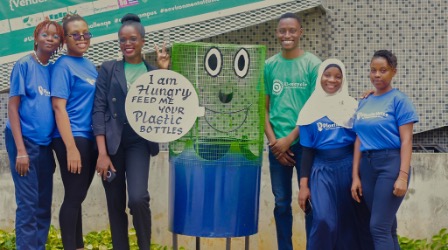By Oluwaseyi Jesuton
In many marginalized communities across Nigeria and Africa, people live from birth to death in dumps of waste and plastic pollution, not because they want to but because they have no other choice.
Over 17 million tons of plastic waste are generated by Sub-Saharan Africa annually. However, only 12 per cent is recycled.
I am Nigerian – from the most populous Black nation on earth. It is a country with a myriad of socio-economic challenges like poverty, insecurity, political instability and marginalization, coupled with the increasing disregard for environmental protection.
Yet, I have chosen to tackle environmental issues because I strongly believe that nature is at the core of all we do.
My interest in tackling plastic pollution started when I was a 16-year-old high school student. I was tired of seeing the increased levels of pollution in my country. I was also concerned that the next generation was not being meaningfully involved in creating solutions to this ticking time bomb of plastic pollution.
Since then, driven by relentless passion, I have developed and implemented innovative solutions, leading over 65 youth-led projects over the past seven years to address the plastic pollution crisis and drive climate action in Nigeria and beyond, primarily through my nonprofit, U-recycle Initiative Africa.
For example, I spoke at the United Nations INC-3, deployed ‘talking” recycling bins across leading universities in Nigeria, developed a tech-enabled, gamified learning platform about plastic pollution and hosted climate education workshops in low-income schools across Nigeria.
My team and I have become a determined force, on a mission to accelerate unprecedented youth-led solutions to the plastic crisis in Nigeria and Africa.
Recycling serves as a good way to create value or wealth from waste, but it should never be relied on as the only solution.
Oluwaseyi Jesuton, 23-year-old, Nigeria
I used to think recycling was singularly the solution to the plastic pollution crisis – hence the name ‘U-recycle’.
However, as I delved deeper into understanding this problem, I discovered that recycling barely scratches the surface. Recycling serves as a good way to create value or wealth from waste, but it should never be relied on as the only solution. Why? According to the United Nations Environment Programme (UNEP), only 9 per cent of plastic waste ever produced has been recycled. About 12 per cent has been incinerated, while the other 79 per cent has accumulated in landfills, dumps or the natural environment.
It is evident that we cannot recycle our way out of this ubiquitous issue. We need to turn off the tap.

Oluwaseyi Jesuton helps advocate for managing plastic pollution in Nigeria.